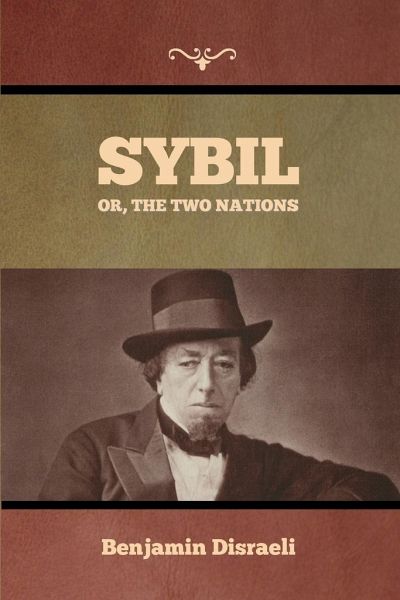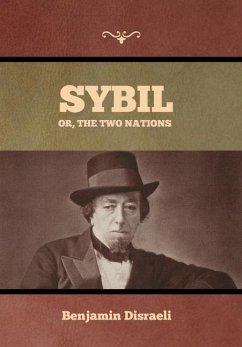
Sybil, Or, The Two Nations
Versandkostenfrei!
Versandfertig in 1-2 Wochen
19,99 €
inkl. MwSt.

PAYBACK Punkte
10 °P sammeln!
Sybil, or The Two Nations is an 1845 novel by Benjamin Disraeli. Published in the same year as Friedrich Engels's The Condition of the Working Class in England in 1844, Sybil traces the plight of the working classes of England. Disraeli was interested in dealing with the horrific conditions in which the majority of England's working classes lived - or, what is generally called the Condition of England question. The book is a roman à thèse, or a novel with a thesis - which was meant to create a furor over the squalor that was plaguing England's working class cities. Disraeli's interest in thi...
Sybil, or The Two Nations is an 1845 novel by Benjamin Disraeli. Published in the same year as Friedrich Engels's The Condition of the Working Class in England in 1844, Sybil traces the plight of the working classes of England. Disraeli was interested in dealing with the horrific conditions in which the majority of England's working classes lived - or, what is generally called the Condition of England question. The book is a roman à thèse, or a novel with a thesis - which was meant to create a furor over the squalor that was plaguing England's working class cities. Disraeli's interest in this subject stemmed from his interest in the Chartist movement, a working-class political reformist movement that sought universal male suffrage and other parliamentary reforms. (Thomas Carlyle sums up the movement in his 1839 book Chartism.) Chartism failed as a parliamentary movement (three petitions to Parliament were rejected); however, five of the "Six Points" of Chartism would become a reality within a century of the group's formation. Chartism demanded: Universal suffrage for men Secret ballot Removal of property requirements for Parliament Salaries for Members of Parliament (MPs) Equal electoral districts Annually elected Parliament Disraeli was particularly inspired by the Royal Commission of Inquiry into Children's Employment, which published a report interviewing working children in 1842. Sybil examines the moral corruption inherent in forcing children to work under such unpleasant conditions. The characters of the sixteen-year-old Dandy Mick and Devilsdust, who is abandoned by his mother and left to fend for himself, are particularly emblematic of this. (wikipedia.org) About the author: Benjamin Disraeli, 1st Earl of Beaconsfield, KG, PC, DL, JP, FRS (21 December 1804 - 19 April 1881) was a British statesman, Conservative politician and writer who twice served as Prime Minister of the United Kingdom. He played a central role in the creation of the modern Conservative Party, defining its policies and its broad outreach. Disraeli is remembered for his influential voice in world affairs, his political battles with the Liberal Party leader William Ewart Gladstone, and his one-nation conservatism or "Tory democracy". He made the Conservatives the party most identified with the British Empire and military action to expand it, both of which were popular among British voters. He is the only British Prime Minister to have been born Jewish. Disraeli was born in Bloomsbury, then a part of Middlesex. His father left Judaism after a dispute at his synagogue; Benjamin became an Anglican at the age of 12. After several unsuccessful attempts, Disraeli entered the House of Commons in 1837. In 1846, Prime Minister Robert Peel split the party over his proposal to repeal the Corn Laws, which involved ending the tariff on imported grain. Disraeli clashed with Peel in the House of Commons, becoming a major figure in the party. When Lord Derby, the party leader, thrice formed governments in the 1850s and 1860s, Disraeli served as Chancellor of the Exchequer and Leader of the House of Commons. ... (wikipedia.org)














